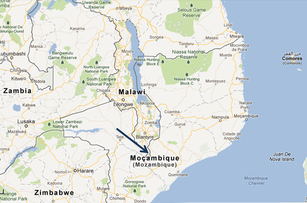By Nature goes Malawi

From february 2013 till february 2014 By Nature will be working on a project in the African country Malawi for the development organisation VSO (Voluntary Services Overseas). On this page I'll give more information about Malawi, the project and the role of By Nature in Malawi. When I am in Malawi I will try to keep a blog (as far as possible due to a uncertain internet connection and electricity in Malawi) on this website.
Malawi is a (relatively) small country in the south-east of Africa, locked in by Mozambique, Zambia and Tanzania. Malawi is best known because of Lake Malawi. The lake covers about 20% of the land of Malawi en is well known because of it's special (endemic) cichlids. Malawi is called the 'warm heart of Africa'. Which refers to the friendly population, but also to the climate.
Malawi is one of the poorest countries in the world and depends for decades on development aid. One of the causes of this poverty are the problems with the climate. The average temperature in the country is rising and the intensity of precipitation is increasing. Malawi is struggeling with droughts and floods, which causes failed harvests, deforestation, etc with al kinds of consequenses.
As a least developed country, Malawi was invited to submit a National Adaptation Programme of Action (NAPA) of the UNFCCC. The aim of NAPA is to identify a country’s most urgent adaptation needs. Soon after the NAPA was submitted in 2006, the Malawian government started working with the African Development Bank (AfDB) to access funding for two major adaptation projects, but there were long delays linked to the AfDB. Consequently Government climate change initiatives have only fully got underway in the last two years. The most important of these is the National Climate Change Programme (NCCP) funded by Norway, DFID-UK, UNDP and Japan.
In the last few years Malawi has made great strides in developing its NCCP and building climate change capacity, but there is still much to be done. Essential national policies have still to be formulated and implemented and to date capacity building has focussed on training rather than on-the-job mentoring. While there is much good work on the ground, a common message is that it is fragmented, valuable lessons are not disseminated and good practice is not being embedded into day to day activities. This is what By Nature is going to start to realise. The project won't be done after a year. But By Nature is going to make a start to a sustainable system to control the effects of climate change.
By Nature will work for the local government of Nsanje, a district in the south of Malawi (shown by the arrow in the top left picture of this page). My work in Malawi will be based on equality. That means that I will work for a local salary (comparable with my Malawian colleagues), with a house in the village. I will have running (cold) water and (at least part of the time) electricity, but basically it's pretty much back to basic.
More information about the project and ways to help VSO and By Nature to realise their goals will follow soon on this website!
Malawi is a (relatively) small country in the south-east of Africa, locked in by Mozambique, Zambia and Tanzania. Malawi is best known because of Lake Malawi. The lake covers about 20% of the land of Malawi en is well known because of it's special (endemic) cichlids. Malawi is called the 'warm heart of Africa'. Which refers to the friendly population, but also to the climate.
Malawi is one of the poorest countries in the world and depends for decades on development aid. One of the causes of this poverty are the problems with the climate. The average temperature in the country is rising and the intensity of precipitation is increasing. Malawi is struggeling with droughts and floods, which causes failed harvests, deforestation, etc with al kinds of consequenses.
As a least developed country, Malawi was invited to submit a National Adaptation Programme of Action (NAPA) of the UNFCCC. The aim of NAPA is to identify a country’s most urgent adaptation needs. Soon after the NAPA was submitted in 2006, the Malawian government started working with the African Development Bank (AfDB) to access funding for two major adaptation projects, but there were long delays linked to the AfDB. Consequently Government climate change initiatives have only fully got underway in the last two years. The most important of these is the National Climate Change Programme (NCCP) funded by Norway, DFID-UK, UNDP and Japan.
In the last few years Malawi has made great strides in developing its NCCP and building climate change capacity, but there is still much to be done. Essential national policies have still to be formulated and implemented and to date capacity building has focussed on training rather than on-the-job mentoring. While there is much good work on the ground, a common message is that it is fragmented, valuable lessons are not disseminated and good practice is not being embedded into day to day activities. This is what By Nature is going to start to realise. The project won't be done after a year. But By Nature is going to make a start to a sustainable system to control the effects of climate change.
By Nature will work for the local government of Nsanje, a district in the south of Malawi (shown by the arrow in the top left picture of this page). My work in Malawi will be based on equality. That means that I will work for a local salary (comparable with my Malawian colleagues), with a house in the village. I will have running (cold) water and (at least part of the time) electricity, but basically it's pretty much back to basic.
More information about the project and ways to help VSO and By Nature to realise their goals will follow soon on this website!

